 |
 |
 |
If nice guys finish last, Takagi Sakuya has nothing to worry about.
Watching this match play out, all of the incredible frustration I felt while reading it in the manga comes flooding back to me. And it’s a totally different kind of frustration than I felt during the Ide match, which is why I like the fact that Katsuki-sensei placed this matches almost back-to-back the way she did. Ide and Takuya represent almost total opposites as opponents in every way it’s possible to do so.
Not only are these boys’ styles on the court radically different, but Ide is the essential swashbuckler – a smiling warrior who always draws his strength from the cheers of the crowd. Takagi, by contrast, is as classic a “black hat” as there ever was. Not only is he willing to do anything to win and doesn’t care if that makes people hate him, I’ve always kind of felt that guys like Takagi actually get off on being hated in the same way Ide-types get off on being loved. Guys like Takagi thrive on the delusion that the world is out to get them, and draw their strength from their rage against that perceived injustice.
There may be some viewers who don’t follow tennis who think what we’re seeing with Takagi is unrealistic. Let me tell you, as anyone who closely follows the sport or better yet played it competitively knows, it’s not. I don’t remember when I said it (way back in the hazy days of the early first season) but tennis is a sport that tends to attract characters – women and men with outsized personalties and a much larger than normal array of quirks. It’s the solitary, visceral nature of the game I think. And players like Ide and Takagi are not just realistic, but not even all that uncommon.
Takagi… I always hated guys like him, as a player, as a fan. And I’ve seen every trick he pulls in this episode multiple times – there’s not a single exception. But Maruo is, as Aoi-san calls him, a “thinking reed” – indeed, Blaise Pascal’s elegant phrase could hardly be better-suited to anyone. Maruo isn’t blessed with Takuma’s height or Araya’s brute strength or even Ide’s raw charisma, but what he has in his fragile body is a brain that never stops analyzing – not least of all analyzing itself. Maruo is uniquely aware of what Takagi’s gamesmanship is doing to him, and that’s the crucial edge his nature gives him.
Still – as Aoi says, this is a different sort of pressure than any Ei-chan has faced before. Even something as simple as the constant glaring Takagi does can have an impact on you – watching Ei-chan here I’m reminded of a friendly cat that wants to play with a new cat he’s just met, and doesn’t quite get why the other guy keeps hissing and arching his back. Ei-chan inexperience and earnest nature make him initially vulnerable to Takagi’s tricks, but as always it’s that relentless self-awareness that keeps him from going off the cliff.
Takagi doesn’t even wait for the match to start to launch his arsenal – he tries to hit Ei-chan off the court in warmups – and opens the match with an underhand serve. There are two types of tricks Takagi relies on here, those literally within the rules and those abjectly illegal, and the underhand serve is the former – dodgy but legal. Normally you’d only see it when a guy is either cramping or too nervous to serve normally, but it’s effective in a very important way – it keeps the opponent off-balance and more vulnerable to a traditional power serve. Takagi also employs a quick serve (closer to the edge, but likely still barely within the rules) like a pitcher would, to throw off the hitter and baserunner’s timing.
The laundry list goes on and on. Serving while Ei-chan was tying his shoe is just bush league, tossing a ball back when his back is turned outright deplorable. But where Takagi’s gamesmanship crosses the line into abject cheating is when he pretends his wasn’t ready after being aced, and fakes an injury to freeze the momentum when he’s down 0-30 in a crucial service game (that one is very common among the pros). Frankly, there’s just no excuse for skullduggery like that – it’s demeaning to the game itself – but the problem is, as an opponent the more you let it morally outrage you, the worse off you are. You can’t beat a guy like Takagi by engaging him on his level – it simply doesn’t work, as Ei-chan quickly finds out. But knowing that and acting on it are two very different things, even for someone with Ei-chan’s mental discipline.
It’s easy to look at a guy like Takagi and say “He’s really good even without all this nonsense – why does he have to rely on cheap tricks?” And he is really good – but playing with Nabae has made him realize he’s not quite good enough. And indeed, though he and Ei-chan go to a first-set tiebreaker, it was Ei-chan who had the better of the play in those 12 games. As for what happens in the tiebreaker – Takagi hitting straight at Ei-chan when he’s helpless at the net after a weak volley – that’s neither illegal or uncommon (and indeed, strategically a very sound shot as it’s near-impossible to return with any authority). But hitting straight at a guy’s head – especially after a body shot – sends a very clear message about the guy hitting the shot. Now it’s on Ei-chan to rise above Takagi and defeat him without resorting to gamesmanship of his own, but anyone who knows tennis could tell you that’s a lot harder than it sounds…
 |
 |
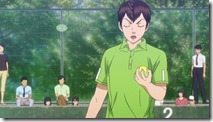 |
 |
 |
 |
 |
 |
 |
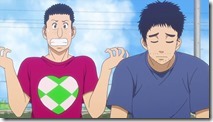 |
 |
 |
 |
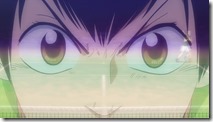 |
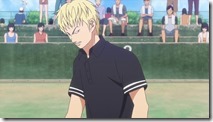 |
 |
 |
 |
 |
 |
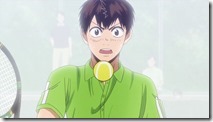 |


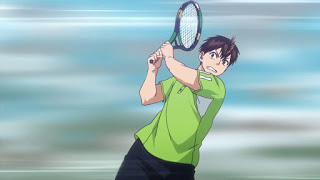
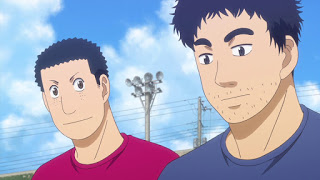
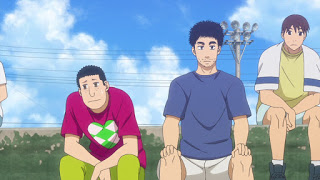
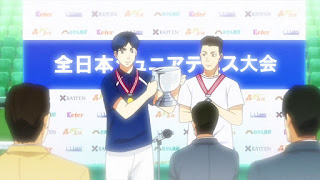
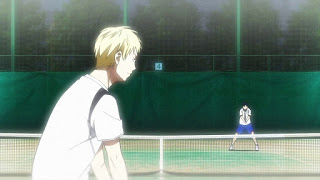
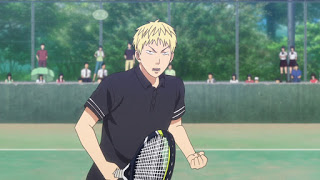
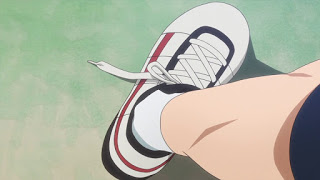
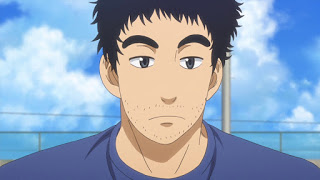

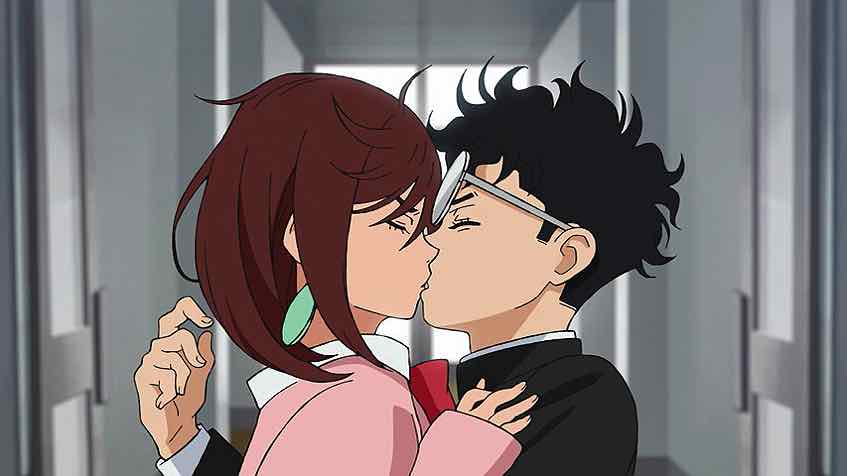
Jay Psi
August 16, 2015 at 9:03 pmI'm not sure how you managed to write all this without mentioning Djokovic to be honest. Let's be fair – as you say, plenty of tennis players engage in gamesmanship so Novak is by no means especially heinous in this matter but his set-down Grand Slam injury timeouts are surely the most high-profile example, even if they aren't as prolific as they used to be…
But nobody would bother with any of this if it didn't work, time after time. I have to admit to getting the red mist in the ring a few times, you can imagine how well that turned out for me. It was a double blow in my case – it took the fun right out of the match (which I relied on to perform well) so I was simultaneously enraged and dispirited.
Nadavu
August 17, 2015 at 2:10 pmI'm still a little puzzled about the scene where they decided who serves first. Maruo's "he didn't even check, he knew!" implies some kind of breech of etiquette, but I don't see why. What does it matter if Takagi knew in advance if the logo is up or down? the odds are 50% either way. What am I missing here..?
Here's another tennis n00b question: If a player manages to hit the ball straight at his opponent's face, causing enough damage for the opponent not to be able to continue playing (like a broken nose, or a swelled shut eye), does he win by default? If so, it sounds like a pretty good strategy when you're massively behind…
admin
August 17, 2015 at 7:20 pmI don't think he was upset – just surprised Takagi knew.
In theory yes, he would win by default. But not only is it incredibly bad sportsmanship to try and hit someone in the face, it's also very unlikely someone is going to be seriously hurt.
melodic thoughts
August 17, 2015 at 2:51 pmIt was a shining example of the type of player Maruo is when he said he was impressed by Takagi's resourcefulness to win (underhanded, but still quite clever). He is the kind of player who enjoys a game with any kind of player as long as he thinks it helps him improve his skills.
I laughed out loud when Takagi stamped his foot though.
I think it is telling when Nabae commented that he is too fixated on petty tricks that he cannot improve. Time for another of Maruo's lesson plays that will wake him up to that weakness